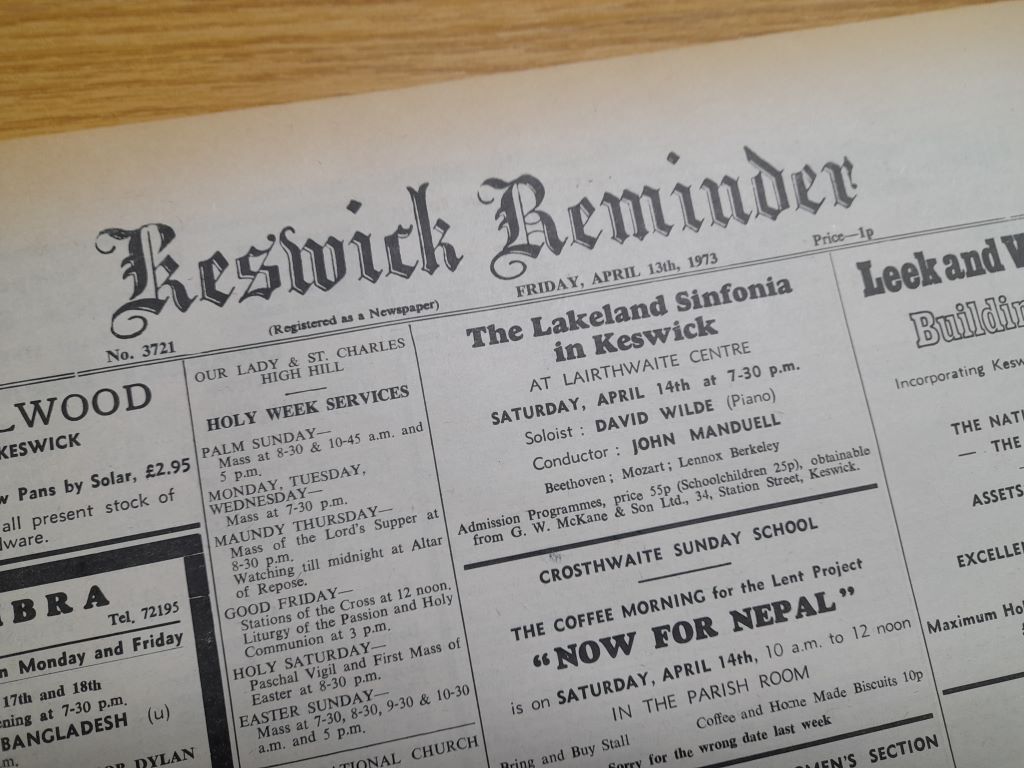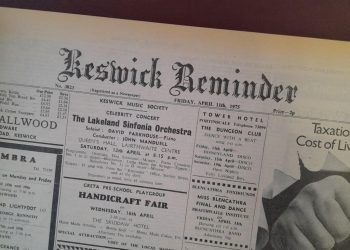
Looking back through the archives of The Keswick Reminder from around this week 20, 30 and 40 years ago.
20 years ago
Osprey watch
The £400,000 redevelopment project that has helped bring hundreds of thousands of visitors to this area is being visited next Tuesday by Lord Clark, chairman of the Forestry Commission and a former Labour cabinet minister.
The visitor centre and osprey exhibition project at Whinlatter Forest Park near Keswick is due to reopen at Whit Weekend (May 24-26) in time for the expected return of ospreys to the region.
Lord Clark started his career as a forester in Cumbria and he will tour the site which is being extended to include a much larger shop and tea room, an interpretative area for display and exhibitions throughout the year, and new restroom facilities.
Graeme Prest, the Forestry Commission’s North West England Forest District manager, said: “Lord Clark visited the area just over a year ago and was keen to return to see how the work is progressing. It promises to be a fantastic new facility which will cater for the growing number of visitors who have been visiting Whinlatter thanks to the Osprey project. Last year more than 105,000 people visited the site.”
School outdoor classroom
The Outdoor Classroom facility at St Kentigern’s CE School was opened on Thursday by Councillor Ron Munby, Mayor of Keswick, accompanied by his wife Helen. This was the culmination of an enormous amount of fund raising by the Friends of St Kentigern’s, the Outdoor Classroom sub-committee and various organisations in the Keswick community. A government grant was also obtained for this educational asset.
The initiative is directly linked to the Effective Early Learning Programme, a self evaluation tool for schools from the Centre of Early Childhood at University College Worcester. Mrs Joanne Lancaster, a teacher at the school, successfully coordinated the project for which the school has a kite mark to celebrate its achievement
Mrs Sara Miller, the headteacher at St Kentigern’s, says the equipment in place at the present time is the first step in a series of plans to make the external environment of the school as exciting and as educational as the internal areas, and staff and governors are very appreciative of the support given by the local community.

30 years ago
Grace Parkinson
With the death of Grace Parkinson, Keswick has lost a personality who was highly respected and much loved, and a teacher who made a considerable contribution to the life and welfare of the town over many years.
Born in Bury in 1904, she was educated at Bury High School and trained as a teacher at Homerton College. After a spell of teaching in Bury she was appointed the first Senior Mistress and Deputy head at Lairthwaite Secondary School when it was opened in September 1951.
She assumed her duties with a brisk cheerfulness and a firm but fair sense of discipline; many ex-pupils will remember her with affection and gratitude.
Outside her professional obligations and particularly since she retired in 1964, Grace was active in a number of organisations, ranging from WRVS Meals on Wheels to playing bridge, from the- Flower Club to the Lecture Society where she served as honorary treasurer from 1955 to 1962 and honorary secretary from 1963 to 1987.
Apart from the Lake District, her two favourite landscapes were the Yorkshire Dales and Scotland. With the intrepid determination of a Freya Stark, she visited every corner of Scotland, including St. Kilda, and proudly reported her adventures on fishing trips with her personal gillie.
For eight years she travelled every week to Burnley to care for her brother but, with characteristic persistence (she always maintained “persistence” was her second name), she organised the Lecture Society and managed to attend its meetings regularly, facing winter journeys with her accustomed tenacity and steadfast sense of humour.
“Parki”, as she was so often called, faced her final illness with matter-of-fact commonsense and quiet dignity — qualities which endeared her to so many friends, acquaintances and ex-pupils throughout along and purposeful life. She will be missed.
Mystery in the park
Park keeper Peter Towers has been discovering hundreds of little piles of soil, each with a hole through the centre, on tennis courts and putting greens in Fitz Park.
The mystery of what creature could have made them was solved this week when Peter saw orange coloured bees swarming in the vicinity and disappearing into the holes. He said: “It still does not provide an answer as to why they should dig holes in certain places in the park. They are all over the grass tennis courts and putting green.”
He added that when he and his staff arrive in the morning there are many new piles of soil. Quite a lot of people have asked what they were but nobody is able to guess the answer. Strangely, there are no signs of the bees on the nearby bowling greens.
“I have seen some bees staggering about as if on their last legs. Maybe the effort of digging up the soil exhausts them – they seem to be digging their own graves!”, he stated.
Peter considers the bees to be a nuisance as well as a mystery, but their digging has not caused any major damage to the park – “in fact, it helps to aerate the soil.” he admitted.
Local beekeeping expert John Swainson of Portinscale says they sound like earth bees which work in the ground. “They tend to appear when the weather gets warmer. I don’t think they sting much so they won’t be a lot of bother,” he said. “There are a lot of these bees up on the fellside in summer. I have known areas to be alive with them, but they aren’t much use to those of us who are interested in honey bees.”

40 years ago
Inquest
The exact cause of a crash involving a 400 m.p.h. Provost jet aircraft near Thirlmere lake may never be known.
An R.A.F. Board and Inquiry and an Inquest have both been held following the death of the pilot, flight Lieutenant Michael O’Neill of Waddington Lincolnshire, on December 9th last year.
An inquest jury at Keswick on Wednesday returned a verdict of death by misadventure.
Flight Lieut. O’Neill crashed while on a training fight from Church Fenton in Yorkshire. He had re-fuelled at Edinburgh before flying south through the Lake District.
Flight Lieut, Keith Walker of York told the hearing that an R.A.F, Board of Inquiry had indicated no technical fault with the Provost jet trainer. “For no reasons which can be determined the aircraft crashed in the position given,” he said. “They were unable to determine the precise cause.”
The West Cumbria coroner Mr. Adrian Walker referred to recent controversy, especially in West Cumbria, over low flying planes and asked about the height of aircraft going over Thirlmere lake.
Flight Lieut. Walker said: “It is extremely difficult to determine the height of any aircraft, especially in regard to the speed because the faster a plane is flying the lower it appears to be. I would hesitate myself to be accurate within 500 feet without measuring instruments or a statement from the pilot.”
Replying to a jury question he said pilots were authorised to fly at minimum heights, and those mentioned by Wednesday’s witnesses were legal.
Flight Lieut, O’Neill was a “skilled and sensible ” pilot. “The accident came as a complete shock and surprise. I am unable to imagine any reasons for its occurrence,” added Flight Lieut. Walker.
Farmer Richard Akrigg, Fornside, St. John’s-in-the-Vale, told the inquest that shortly after the plane disappeared into the blanket of mist over the lake he heard a muffled thud.
National Park Ranger Desmond Oliver, of Stanah Cottages, Thirlmere, heard an aircraft approaching from behind. He estimated it was about 200 feet above the ground and the engine sounded normal.
Mr. John Gates of The Hawthorns, Keswick, was working alongside the lake when he heard a jet in the distance. He could not see it because of the visibility. He saw a flash of the explosion through the mist about three-quarters of a mile away.
The jet had been at normal height for planes coming down the lake – about 200 feet. Mr. Gates said some were a lot lower, coming down at 50—100 feet and only last week there had been one down to the level of the road.
Joseph Bland, retired farmer, Chapel How, Stonethwaite, was on the west side of Thirlmere when he heard a plane coming down the lake from Keswick. He saw it come down steeply out of the mist and go right into the trees and explode.
The coroner said the R.A.F. had been able to find no technical malfunction and what happened no-one would probably ever know. It was possible the pilot may have become disorientated in the mist. “However skilled and cautious the pilot was, something happened in that mist, a slight error of judgement, which caused him to crash,” he said.
Refuse tip
Fresh claims that liquid from Keswick’s refuse tip has been seeping into Derwentwater came at Thursday’s meeting of the Town Council General Purposes Committee.
Mr. Martin Jordan, who has been fighting for several years to get Cumbria County Council to stick to a rigid closing date for the tip, he said liquid was seeping into the lake and flowing across a footpath between Crow Park and the Isthmus. He also stated that the tip, which is leased from the National Trust, was above the permitted height. The tip was becoming more and more visible and could be seen by thousands of visitors to Keswick every year.
He asked the Council to write to the National Trust. “They should have more interest in this than anyone else,” he said.
He looked with disbelief at the date stated for the closure of the tip. The notice, he said, was carefully worded to say it was the anticipated date for closure. “My anticipation is not quite as gullible as that.”
50 years ago
Letters to the editor
Dear Sir – Litter – all normal folk are sick of the word, and even more so of the sight of it.
Some time ago you mentioned how some local school children had done a good job clearing litter from Calf Close Bay – very commendable.
With the 1973 Litter Season just about to open, what a splendid thing it would be if everyone – grown-ups and children – made a special effort not only to avoid throwing litter about, but also to play an active part in clearing it up. I make two suggestions.
Firstly, when the next Bob-a-Job week comes along, that the youngsters be given a large bag or container of sorts, and told to ‘get cracking’ by the Lake, in Fitz Park, or anywhere in our lovely countryside which is being spoilt by the miserable fish-and-chip-paper scatterers, bottle smashers, and other louts.
Secondly, instead of the walks, swims, runs, etc, organised to raise money for charities, let there be substituted Litter Clearance Drives, with a guaranteed rate of a ‘tenner a hundredweight’ or something similar. In which case, the money would still be raised, the countryside would become a bit cleaner, and – with luck – it might even teach some of those taking part to keep their own countryside clean.
Yours truly,
William Donald,
Church Street,
Keswick.
April 10th, 1973.








